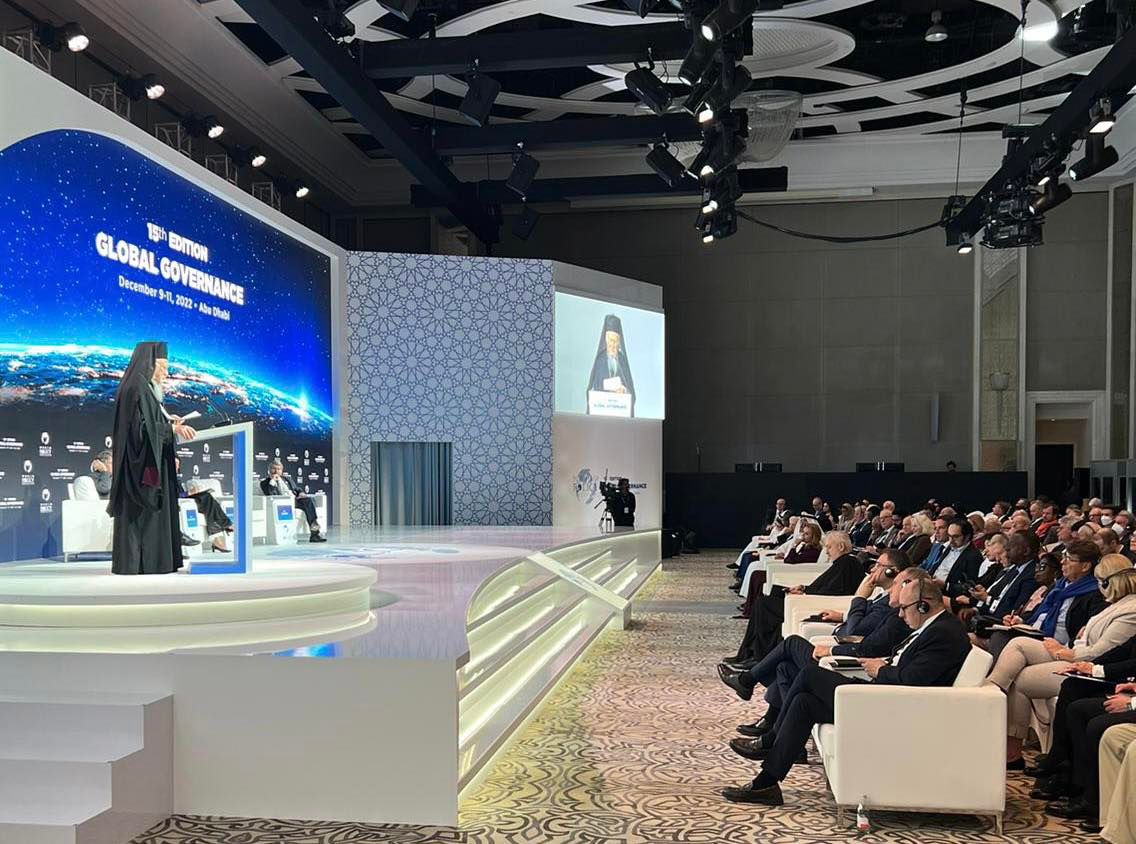 His All-Holiness the Ecumenical Patriarch Bartholomew participated in two International Conferences of Interreligious and Intercultural Dialogue in Abu Dhabi on 9-13 December, 2022.
His All-Holiness the Ecumenical Patriarch Bartholomew participated in two International Conferences of Interreligious and Intercultural Dialogue in Abu Dhabi on 9-13 December, 2022.
In a new resounding condemnation of the war in Ukraine, the Ecumenical Patriarch in his speech at the opening of the International Conference “World Policy Conference – For a Reasonably Open World”, underlined that the ongoing war has led to the death of thousands of people, Ukrainians and Russians, while the damage to infrastructure on the territory of Ukraine is incalculable.
His Holiness, in his extensive speech, before dignitaries from all over the world, referred to the historical spiritual ties of the Kievan Rus with the Ecumenical Patriarchate, from which they received baptism into Christianity, in the 10th century, and to the attempts to undermine the Patriarchal Church of of Constantinople and its role in the Orthodox world from Russia, after the Fall of the City, and especially from the 19th century, when in combination with the doctrine of pan-Slavism, it instrumentalized religious sentiment to achieve political and military purposes alien to it. This attitude, which aimed at the removal of the Slavic believers from their Mother Church and the promotion of Moscow as the “Third Rome”, led the Ecumenical Patriarchate to condemn it, in 1872, as a heresy, the heresy of ethnophylitism, which comes in blatant opposition to the universality of the Gospel message, but also to the ancient tradition of organization and administration of the Church.
This heresy of ethnophylitism, with its vehicle of Pan-Slavism and the division of the Patriarchate’s flock, as the Patriarch emphasized, was useful for Moscow’s goals and the cause of the hatred caused among the Orthodox Christians of the Balkans, manifested during the Balkan wars and the atrocities that occurred in the early 20th century. In his speech, His Holiness referred to the marginalization of religion during the period of the Soviet Union, and its re-instrumentalization in the years that followed its fall.
The Ecumenical Patriarch then referred to the refusal of the Church of Russia to participate in the Holy and Great Council of the Orthodox Church, held in Crete in 2016, and to the deterioration of relations after the Ecumenical Patriarchate granted autocephaly to the Orthodox Church in Ukraine in 2019. He added that the invasion of Ukraine, on February 24, 2022, intensified the polarization.
His Holiness pointed out that all of the above, in addition to their importance for church life, testify to the growing role of the religious factor in major global issues. The Ecumenical Patriarch underlined that the source of the problems is the instrumentalization of religion by persons who often have no real faith. He noted that the Russian Orthodox are a great asset for Orthodoxy and for the whole world. Concluding his speech, His Holiness emphasized that sometimes experts in international relations tend to ignore or marginalize the role and importance of the religious factor, either authentic or manipulated.
The issues of immigration and climate change and their religious and social dimensions were at the center of the speech addressed by His All-Holiness the Ecumenical Patriarch Bartholomew, on 12 December, 2022, during the opening of the two-day International Interfaith Meeting jointly organized by the G20 Interfaith Forum Association and the Interfaith Alliance for Safer Communities entitled “Engaging Faith Communities: G20 Agendas and Beyond”, in Abu Dhabi of the United Arab Emirates.
In front of high officials and a dense audience, His Holiness, speaking in the English language, underlined the importance of protecting and maintaining the integrity of all of God’s earthly Creation for present and future generations.
The Patriarch said that climate crises and migration reflect excruciating human suffering. He said the Earth is facing a series of unprecedented ecological crises, with the temperature rising in the Arctic, climate change driving endangered species to the brink of extinction, and deforestation of tropical forests occurring at an alarming rate in recent decades. In the meantime, he continued, many migrants were forced to leave their homes either because they experienced inhuman and degrading treatment, or because the consequences of climate change caused chaos and destruction.
He noted that it is not environmental refugees who are responsible for climate disruption, but the actions of others, during years of overconsumption, which have affected these refugees the most. He also reminded that in the Encyclical of the Holy and Great Council of the Orthodox Church, held in Crete in 2016, the spiritual dimension of this crisis is highlighted. He then emphasized that the Environment is not only a political or technological issue, but primarily a religious and spiritual problem. That is why, he added, religion has a decisive role to play, and noted.
In his speech he noted that wars, armed conflicts, poverty, environmental degradation and climate change are the reasons why many people have been forced to leave their homelands, despite the fact that most want to live and prosper where they were born and their ancestors lived for generations. However, in order to remain in their homelands they ask for security, food self-sufficiency, economic opportunities, good environmental conditions and prospects for the future of their children.